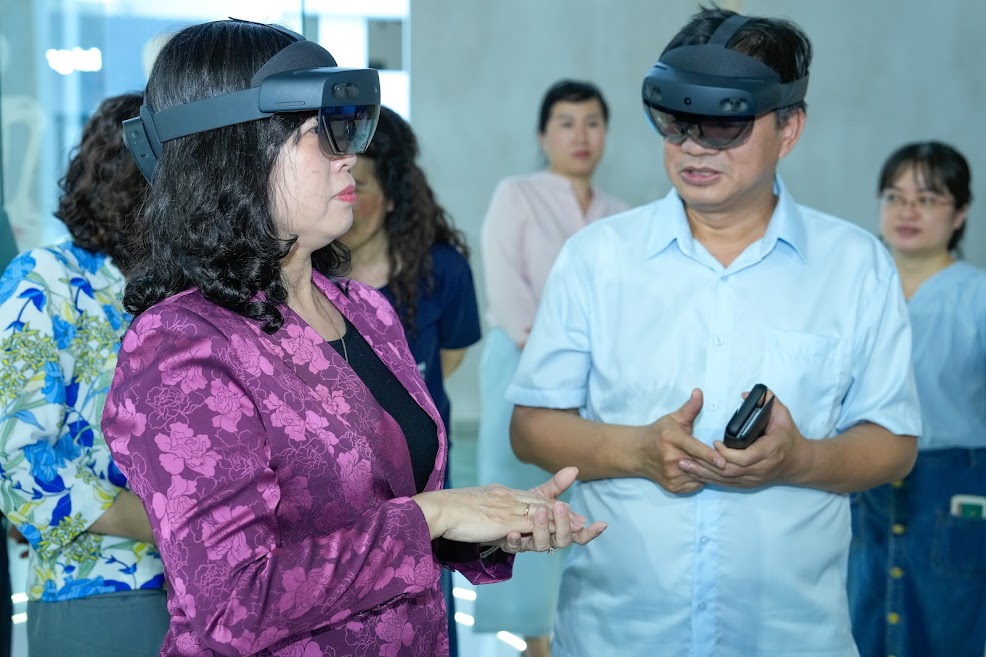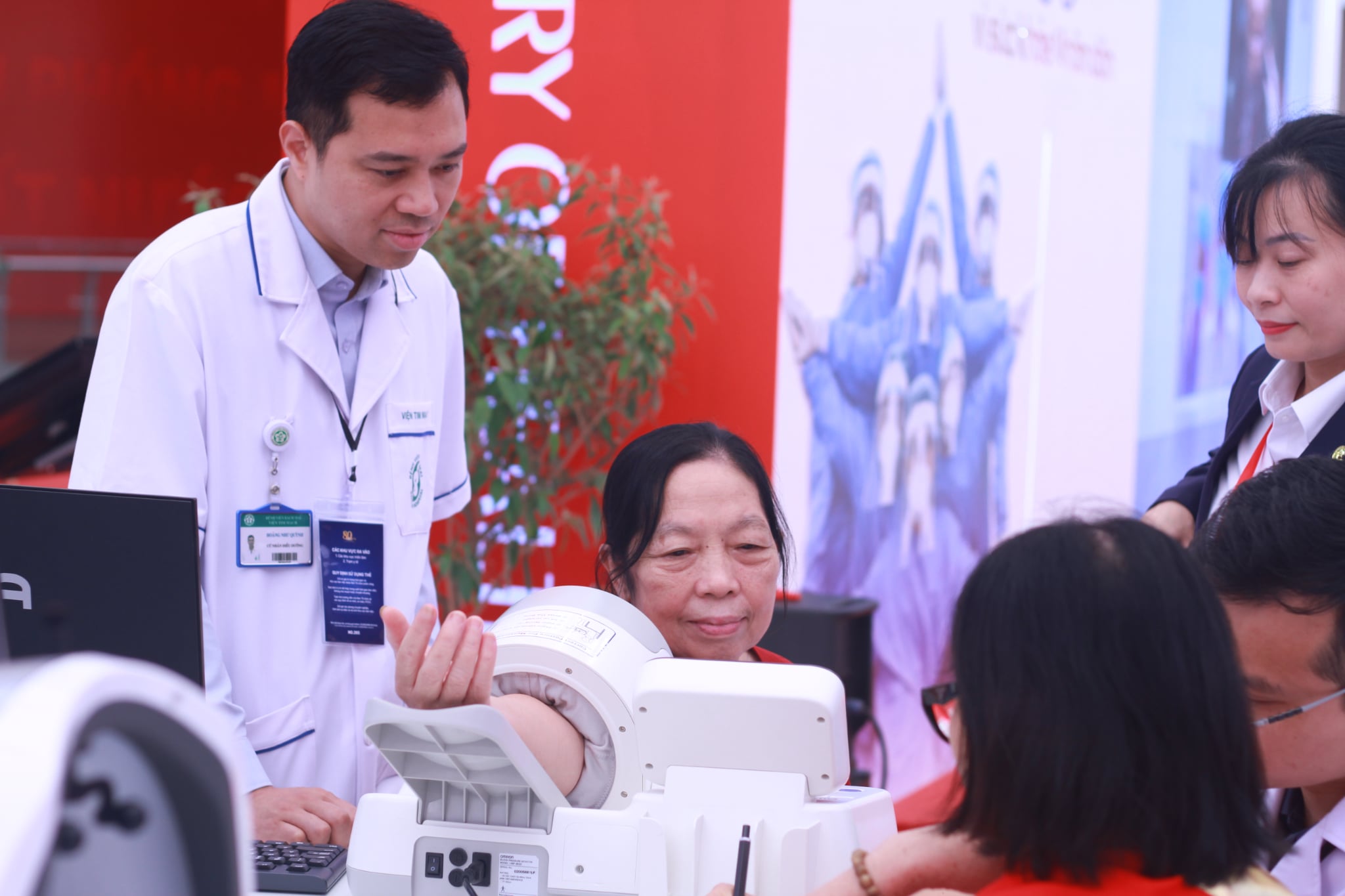On 28/8, many people visited the National Achievements Exhibition, "80 Years of Independence - Freedom - Happiness," at the National Exhibition Center in Dong Anh, Hanoi. The Ministry of Health's booth showcased various current healthcare technologies. A highlight was the innovative Hololens augmented reality (AR) glasses.
After experiencing the technology, Associate Professor Dao Xuan Co, Director of Bach Mai Hospital, explained that the device allows doctors at lower-level hospitals to connect directly with Bach Mai specialists in real-time. Through the glasses' transparent display, instructions from specialists appear directly at the required location, enabling more precise and timely treatment.
"This technology helps bridge geographical distances, reduces unnecessary patient transfers, and facilitates online clinical training, turning each case into a 'bedside classroom'," he said.
Each AR-connected examination by a doctor at a lower-level hospital becomes a real-time guided session with a specialist, covering symptoms, diagnostic methods, clinical indications, conclusions, and treatment plans. This practical training significantly improves the knowledge and skills of primary healthcare physicians.
In critical cases requiring immediate specialist intervention, the AR system can be life-saving by promptly connecting specialists, especially in emergencies where they cannot be physically present.
 |
Minister Dao Hong Lan and Professor Dao Xuan Co experience augmented reality glasses for medical examinations. Photo: The Anh |
Minister Dao Hong Lan and Professor Dao Xuan Co experience augmented reality glasses for medical examinations. Photo: The Anh
For years, overcrowding at central hospitals has forced patients nationwide to travel to Hanoi and Ho Chi Minh City, even for cases treatable locally. Augmented reality technology addresses this issue. Instead of bringing patients to specialists, the technology brings specialists to patients.
With an internet connection, patients anywhere can access leading specialists. This solution saves costs, reduces waiting times, and improves treatment quality. Each AR-connected case also serves as a "live practical training session," enhancing the capacity of lower-level medical staff.
Associate Professor Vu Van Giap, Deputy Director of Bach Mai Hospital, believes that augmented reality technology can be widely implemented in numerous medical centers and facilities. Integrating advanced AR devices will further enhance connectivity between central and lower-level hospitals, particularly in specialized fields.
"Showcasing this technology at the exhibition provides the public with a glimpse into the future of digital healthcare, where geographical distance and expertise barriers are diminished through innovation," Dr. Giap stated.
Visitors could also explore the 80-year journey of Vietnam's healthcare development, from battlefield clinics during wartime to milestones like eradicating smallpox and polio, controlling SARS, and achieving notable advancements in organ transplantation, AI application, 3D printing, and digital health transformation.
Health Minister Dao Hong Lan emphasized that the exhibition not only offers an engaging experience but also fully showcases the role and contributions of the health sector in public healthcare, aligning with the achievements of 80 years of national development.
A special highlight at the Ministry of Health's booth was the free AI-powered virtual reality experience for medical image diagnosis. Visitors could bring their personal CT scans, which technicians processed in 1-2 minutes, producing diagnostic results with specific parameters and images.
This application boasts 98% accuracy in detecting tumors and lung lesions, aiding in early lung cancer detection through simultaneous analysis of CT scans, endoscopy, and histopathology. It also diagnoses complex cardiovascular diseases like myocardial infarction. This application is the result of state-level research conducted by Bach Mai Hospital and was made directly available to the public at the exhibition.
 |
Visitors receive medical examinations at the exhibition. Photo: Phan Duong |
Visitors receive medical examinations at the exhibition. Photo: Phan Duong
In addition to experiencing modern medical technologies, visitors received free screenings in three specialties: cardiology (blood pressure measurement and risk assessment), dermatology (skin examination and consultation using modern technology), and musculoskeletal (3-4D joint examination and ultrasound for early damage detection).
Dang Thi Long, 71, from Hanoi, experiencing lower back pain, visited Bach Mai Hospital's examination area. Dr. Nguyen Duc Phong, who examined her, explained that the ultrasound machine used at the exhibition has new functionalities, compatible with various probes, capable of scanning wider areas, assessing tissue elasticity through color representation, and detecting even the smallest lesions.
Hai Anh also tried the skin analysis machine. With AI support, the machine assessed skin age, signs of aging, wrinkles, and pores, providing more accurate results than visual observation. The results were delivered through the Bach Mai Care app, a comprehensive health record management tool recently implemented by the hospital.
Visitors could also register for blood and organ donation at the experience zone, promoting the spirit of sharing for community health.
Le Nga - Phan Duong












